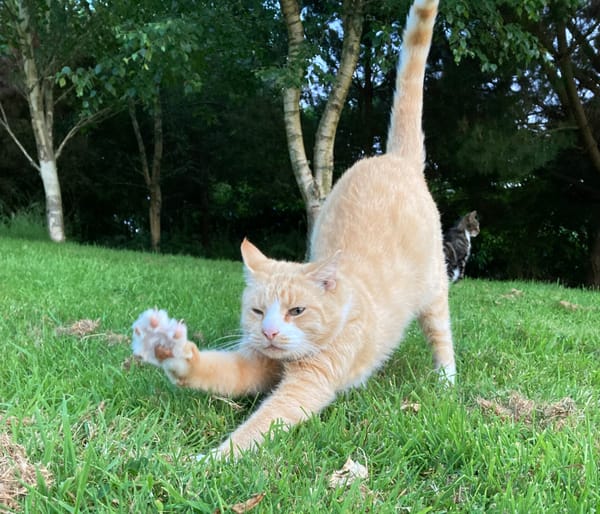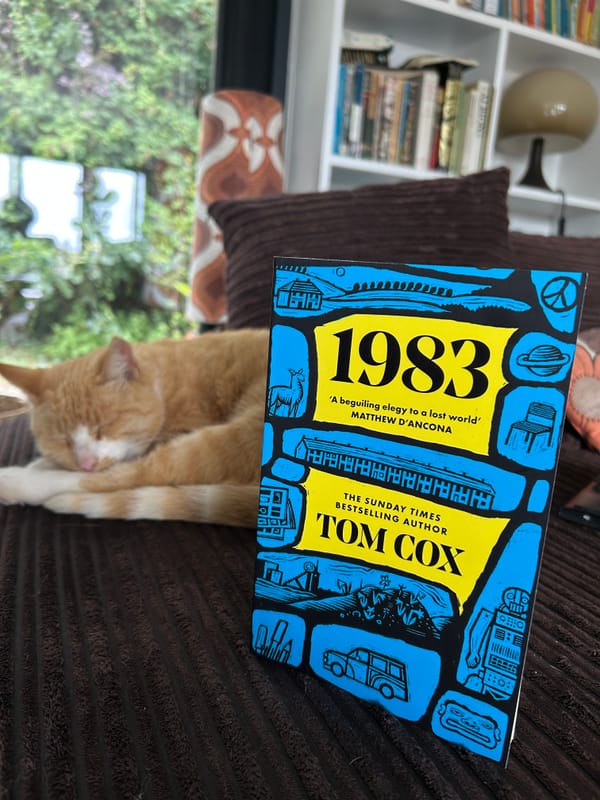Now Get Back To It, You F***ing Baby
Six New Stories


The Date
She arrived for their date with a burn on her cheek. She said it was because she’d been feeling tired all day and had made the error of napping against the door of her logburner. He told her not to worry. “I’m not worried,” she said. “I’m just explaining how I burned my cheek.” He began to speak about his two bands and the novel he was working on. She talked about her hopes for the future, including the one that more people would begin to speak out and raise awareness about how awful it was to drink a glass of water directly after eating an apple. He seasoned his conversation liberally with quotes from songs in the hope it would validate him in her eyes as a person of complexity and taste. She recognised and ignored them and talked about her favourite conspiracy theories, such as the one that JFK’s head had done what it did in the open-top car entirely on its own. Though his sense of smell was weak, he thought she looked like a person who would be effortlessly fragrant. She thought he looked like someone who had once had a moustache: it was something about the blank desert nature of his face, the way it seemed to yearn for someone to grab a crayon and hastily colour it in. He overpopulated his anecdotes and told her a prolonged story about someone she’d never met which made no sense if you didn’t have a prior knowledge of its central character’s weak points. She enjoyed spontaneously fabricating a past for herself, including the unfulfilling autumn she had once spent composing call waiting music for orthodontists. 10pm rolled around and she told him her train was due to leave soon. He insisted on accompanying her to the station and discovered she had not lied. “How old are you?” he asked. “27,” she replied. He was amazed that someone so young already owned a train.
A Commission Accepted
While pacing the heath alone I ran into Wilkinson, who told me he had spent the night being pursued through a forest by equine ghosts again. Gesticulating wildly with a frayed polythene bag from a defunct supermarket, containing what appeared to be the desiccated corpse of a spiny mammal, he announced that his aim was to climb the hill to the Georgian obelisk and absorb as much of the monument’s energy as was feasible before sundown. I noticed he had shreds of charred bank statement in his hair and, registering my concern, he explained that he’d earlier inadvertently stepped into the windpath of a spinster’s bonfire. That was the afternoon that, against several of my best instincts, I finally accepted a long-standing invite to become his authorised biographer.
Now Get Back To It, You Fucking Baby
Up at the convent on the mountainside in the unrelenting fog, Sister Agnes Pryce-Haggard sighed. “Stones!” she muttered to herself. “My whole life is stones.” Prioress Marianne had announced she wanted the extension of the convent completed in less than a month and there was still an ineffable workload ahead of her. Even with her unforgiving new early morning alarm system and 23 of her nuns working 14 hour days lugging granite, Agnes was by no means confident the deadline would be met. The fog had made the work significantly more difficult, with nuns often colliding with one another painfully. No doubt the weekend would bring more casualties. Just last night, Sister Wendy Hinchcliffe had collided with Sister Nancy Daly while carrying a particularly large stone for the south wall, leaving Sister Nancy Daly unconscious for more than an hour. When Sister Nancy awoke, with a whimper, the first thing she saw was the furrowed brow of Sister Agnes above her, like a callous crack in the sky. “You’re fine,” said Agnes. “Now get back to it, you fucking baby.” Replaying the evening in her head, Agnes asked herself, for the umpteenth time in recent weeks, what kind of person the pressures of middle management were turning her into. Heavy yet unweighable, the fog silenced the mountainside, swaddling her in solitude. She exhaled into it, insensitive to much that had once thrilled her, although not impervious to the seductive dragon aspect of her hot breath.
Thief
One day while Dawn and her dog Houdini were walking innocently along the high street they were almost knocked to the tarmac by a thief being pursued by three policeman. “I used to work with that guy,” said Houdini, prompting Dawn to realise that, contrary to what she’d assumed, the one-sided nature of their previous conversations had perhaps been more down to his reticent nature than any insurmountable language barrier.
Thug
Much later in the summer as Dawn and Houdini walked over the bridge from the railway station they noticed a crowd was gathering outside a pub that Dawn had never personally visited but been warned “had a bit of a reputation”. A huge bald man had been pinned to the ground by two security guards. The security guards had used drawing pins and there was concern building amongst the onlookers that the man would not be held in position much longer.
Old Litkinov
Old Litkinov owned the bookshop and, back when I was a poor student, I would sometimes sell books to him that I had stolen from delivery trucks, supermarkets and the bedrooms of people who’d verbally undermined me. Ever-perceptive, Litkinov surely knew what was going on and when I arrived with my weekly rucksack full of paperbacks he never questioned my sources. An eccentric character, misunderstood by many, he was the natural ally of those trying to screw the system and carve out a living on the margins of society. The shop had been there since before forever and I heard from acquaintances that there had been other, even older Old Litkinovs in charge of it prior to Old Litkinov. On the loftiest of the building’s four storeys was a storage room with a sagging floor and two old triple-decker beds, which the latest Old Litkinov had generously opened as a bunkhouse for passing bohemians and bookworms in the grip of penury. Always he would put a crucial opening question to his potential lodgers, “Do you write poetry?” If the answer was yes, they were turned away without mercy.
The neighbourhood was a hotbed of poets in those days and, although my antipathy to verse was nothing like as prickly as Litkinov’s, I have to admit that I found most of these individuals grating, arrogant and pretentious. All the poets were constantly hosting workshops from which they made much more money than their actual poetry, and this only led to even more poets hosting even more workshops to support their unsuccessful poetry, and the character of the city was visibly taking a turn for the worse as a result. In a characteristically counterintuitive gesture, Litkinov would often keep the shop open late into the evening to host open mic poetry nights. These he would usually sabotage by setting fire to his hair with a candle or playing Bartok’s Concerto For Orchestra at such a volume that no other sound in the room could be heard.
“There’s a position opened up, and I wondered if it might be of some interest to you,” Old Litkinov said to me when I’d been visiting the shop for six months or so. As he spoke, he did not lift his eyes from the thick Algerian novel he was reading. “It’s not a lot, maybe 20 hours a week, and the pay’s nothing to send a postcard home about.” The previous week I’d dropped out of university after being accused of placing savoy cabbages on the seats of the royal lecture theatre prior to the visit of a celebrated neuroscientist, and now it was December, the month of daytime nights where you feel like the dark is closing in on you from both ends of the tunnel, and you fear, counter to what experience has told you, that the days will never again expand. I remember, as Litkinov spoke, there was a street lamp flickering directly outside the shop and watching it I was struck by the sensation that I was looking at my life’s one final faltering bit of electricity. “Sign me up,” I said.
I had never seen anyone else working in the shop with Old Litkinov and my assumption was that the truth was less that a position had “opened up” and more that he had taken pity on me. I had a dim view of myself back then - a thief, girlfriendless, excommunicated from my own family - but also possessed a strange, deep inner confidence that I would one day do something hugely important with my life: more important certainly than working in a moderately successful secondhand bookshop. However, the years ticked by, my hours and responsibilities increased, and I realised, to my surprise, that I was not the unhappy young cloud of a man I had once been. I was rarely rushed off my feet, had plenty of time for reading, and the bookshop provided a refuge from the increasingly cacophonous outside world, if you ignored the times I heard Litkinov on the front desk, berating a customer for purchasing a collection of writing by Ted Hughes, Carol Ann Duffy or Philip Larkin. The space I rented at the top of the shop - what had been the lodgings for Litkinov’s itinerant bohemians, before too many poets tried to finagle and lie their way into it - was not large but it was comfortable, and I had been permitted to decorate it to my tastes, without censorship on the part of my landlord slash employer. The only thing it lacked was perhaps a few extra books but I could always find plenty of those downstairs.
As time went on, and I became entrusted with handling more important parts of the the shop’s infrastructure - for example, Litkinov, who despised every bank or building society employee he had ever met, now left it to me to count the day’s takings, subtract from them what was needed for that week’s groceries then place the remainder under a loose floorboard in the Literary Criticism section - I obviously sometimes thought about Litkinov’s advance age and how that related to the future of the business. His birthdays went by: 97, 104, 111, 118 (Litkinov preferred to age in sevens), but he continued, undaunted, his mind as sharp as ever. He never spoke of any living relatives and I was aware of his growing affection for me, especially via the way he would sometimes grasp my chin in both hands and pass on homespun wisdom to such as “A good table is worth three bad chairs” or “Drink six beers a day but never a drop more and your life will never be be a dry or flooded river.” I didn’t want to make assumptions, but I knew how important the shop was to him, and how much he’d hate it to fall into the hands of a property developer or a chain burrito outlet. Meanwhile, I was not getting any younger myself, and had no family inheritance, savings or pension to fall back on. Spending your days with a person significantly older than you can give you an unrealistic sense of your own youth hence it was with surprise that, around the time of Litkinov’s 125th birthday, I looked into the mirror of the bathroom we shared and realised that my hair was completely grey. Litkinov’s, meanwhile, was now extraordinarily thin, consisting of no more than seven or eight strands in total. This had sapped some of the drama from those moments when he chose to disrupt poetry readings by setting fire to it.
Around that time a surprising development occurred: Litkinov took a wife, by the name of Issy. He told me he had met her in the marketplace while queuing at the Polish stall for the final cured sausage of the day, whose future care Litkinov chivalrously conceded to Issy. My initial reaction was that the pair were a curious match, due to the 104 year age difference and, perhaps more pointedly, because of the stark contrast between Litkinov’s interest in 18th Century French History and Issy’s interest in lip filler. But I am not one to judge and could not deny there was something deeply touching about witnessing Litkinov lecturing Issy, say, about how the lavish spending of Marie Antoinette had contributed to the French financial crisis of the 1770s, and Issy replying, “Llll-ove that for her. Hashtag girl boss.” Litkinov was still the same man in many ways: he continued to smell like an attractive European city and eat bananas in the same apprehensive way he always had, but there was a noticeable new weightlessness to him, too. Soon, the happy couple were introducing one another to their respective families: Litkinov making a rare trip out to the suburbs to enjoy a roast with Issy’s parents and then showing Issy a photograph of his own mother dressed up for an important social occasion during the 1920s, to which Issy replied with emphatic approval, “Oh, for REAL. Skinny queen.” I had never seen Litkinov even close to being in love before and, even though I missed having him all to myself, it was impossible to begrudge the couple their happiness. So when, only a month after their honeymoon, Litkinov announced that he would be leaving the bookshop to start a new business with his bride, I wished him the best.
“So… a nail salon,” I said. “That sounds like fun.”
“Nail salon and fitness tattoo spa, I think you’ll find,” said Issy. “It’s a total vibe.”
“Of course, this also means that the bookshop will need a new owner,” said Litkinov. “And I think I know just the individual.”
“I’m going to guess you’re talking about Craig from the flats over on Shepherd Avenue,” I said. “He’s been looking so down and lost since he lost his job as Deputy Manager of Waterstones.”
“No, you, you idiot. It’s all yours.”
So that’s how it happened, the way I became, through no real ambition or special ability of my own, the manager of a secondhand bookshop. To be honest, little fundamentally altered after I took over. What was especially peculiar about this ambience of immutability was that when customers came in, they did not seem to notice the change of management. “Good morning, Litkinov, my man,” they would say to me. “Do you have anything by Angela Carter with a red cover?” or “I’m looking for another book on 13th Century Spanish moths that’s just as informative as the one you sold me last year” I decided it was too much hassle to correct them. And when I catch sight of my reflection, I can see the root of their mistake: perhaps all those years with my mentor rubbed off on me in a physical way, as well as a psychic one. The sign above the door is still the same: it says Litkinov Used Books, just as it has done forever. What would be the point of replacing it? That would only serve to confuse valued customers. I think the world changes so fast nowadays, some people just want a solid rock they can cling to, as the sea rages all around them. My job has become to maintain that rock, and I suspect I will end my days contentedly doing just that.
I never did see the real Litkinov again. But one day, a couple of months into my life as bookshop owner, feeling a tiny bit lonely, I went to visit him at the adress he’d given me for his new business venture. But when I got there it was just fields, as far as the eye could see. I don’t know what happened but I trust that, wherever he is, he is getting by just fine. In fact, when I stare in the mirror at night, into the face that was once his, I can go further than that: I can say, categorically, that I know it.




